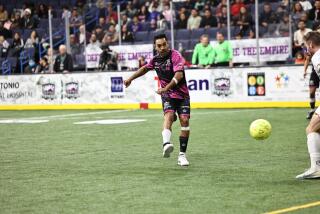He’s Fastly Improved : With His Knee 100%, Sockers’ Clavijo Has Speed to Rank With Top Defenders
- Share via
SAN DIEGO — The race was on.
An orange and black soccer ball had a considerable head start and was spinning toward the goal. Suddenly, Socker defender Fernando Clavijo, inserted as a sixth attacker and wearing a goalkeeper’s jersey, started sprinting from midfield.
The ball was spinning and Clavijo’s thin legs were churning.
Just as the ball was about to cross the goal mouth, Clavijo kicked it away.
Quick now. Who is the fastest player in the Major Indoor Soccer League?
Defender Greg Blasingame of Tacoma? He reportedly has been timed in 4.2 seconds for a 40-yard dash. Gary Etherington of Minnesota? Branko Segota, Cha Cha Namdar or Waad Hirmez of the Sockers?
“I can’t say I’m a better player,” said the soft-spoken and usually quite modest Clavijo, “but with my speed, I can say they never have a chance (in a race).”
Is it any surprise that Clavijo drives a red Porsche?
He has been the fastest guy on his block since he used to dribble 10 blocks from his parents’ home in Punta del Este, Uruguay, to beautiful beaches, which because of their hard sand, were perfect for playing soccer.
“We used to always run and play soccer on the beach,” Clavijo said. “And I used to run 100 and 50 meters in high school. Nobody beat me in my country.”
And nobody is beating him up and down the field in the MISL.
Especially not in the MISL championship series, which continues Friday with the Sockers and Strikers tied at one game each.
“The first time I played against him,” Namdar said, “he was burning our players so bad.”
At the time, Namdar, whose nickname is the “Speedy One,” was playing for Phoenix while Clavijo was on the New York Arrows. Since they have become teammates, Namdar has come to a quick realization that he is “Speedy One” II on the Sockers.
“He (Clavijo) is by far the fastest on the team,” Namdar said. “He would beat me by a good two to three yards if we ran 60 yards.”
Not only is Clavijo fast, but he also is one of the leading candidates to win the MISL defender of the year award. The winner will be announced Tuesday.
“If it happens,” Clavijo said, “that will be beautiful. But I’m more concerned with the team winning than with Fernando Clavijo doing good. My main job is to save goals. These awards are often based on statistics. If you score 20 to 30 goals and you’re a defender, you win defender of the year. Sometimes that makes me crazy.”
Wichita’s Kim Roentved led the league’s defenders in scoring with 26 goals and 38 assists for 64 points.
Clavijo, a former forward who was shifted to defense when he joined the Arrows five years ago, had a career-high 26 points, which included 17 goals. His five short-handed goals tied Daryl Doran of St. Louis for the league lead. In 10 playoff games, Clavijo has three goals and five assists for eight points.
“The increase over last year really just happened,” Clavijo said. “But when Steve (Zungul) left, I felt I had to go forward more and help the team more offensively than I used to.”
Clavijo and Zungul were acquired last year from the Golden Bay Earthquakes, which had folded. In his first season with the Sockers, Clavijo had five goals and four assists. He played in pain and missed nine games last year because of his tender right knee, which was operated on three years ago.
“I know that speed is 90% of my game,” Clavijo said. “I couldn’t do much because of my knee and was probably playing about 60%. Therefore, I didn’t pay any attention to offense. My main concern was not to have any more pain.”
During the off-season, Clavijo did extensive bike work and exercises to strengthen the knee. However, he was still quite concerned when training camp began.
“I was scared,” Clavijo said. “The doctor said the knee should be OK, but I still felt weak. . . . I was also afraid because I was about to start my option year. If you get injured in this league, as soon as you finish your contract, no one cares about you again.”
Clavijo and Bob Bell, the Socker managing general partner, sat down to talk. The result was a three-year contract for Clavijo.
“I think Bob Bell took a chance and I took a chance,” Clavijo said. “I took a pay cut, but I got a guaranteed no-cut, no-trade contract. Once I got that new contract, I felt that whatever happens (with the knee), happens. At least my family would be taken care of.”
Clavijo rarely speaks more than a few sentences without talking about his family--wife Martha and 3-year-old son Jonathan, who recently gained notoriety when he kicked the ball in the net during a game played between quarters of a home playoff.
“My wife gives me a lot of support,” Clavijo said. “She has helped improve my play 95%.”
And he says his knee is now 100%.
Named to the Western Division All-Star team this season, Clavijo also finished second on the Sockers in blocked shots, behind defender Kevin Crow.
It has been the type of season Clavijo dreamed about since 1979, when he left Uruguay after playing six years as a forward for Atenas, one of the best teams in Uruguay’s First Division.
His destination: New York City.
A 22-year-old married man who did not speak English and did not have a job, Clavijo was leaving a sure thing for an unclear future.
“You only have a couple of chances to do things in life,” said Clavijo, now 29. “I felt I had no future there (with Atenas). They told me I was the best player they ever had and that they would try to sell me.”
Clavijo said Atenas didn’t sell him because club officials thought they were not being offered enough money.
“Finally I told them that if they didn’t sell me,” Clavijo said, “they wouldn’t have me anymore. . . . I quit the team.”
Shortly after he arrived in the United States, Clavijo was reunited with a friend associated with the New York United of the American Soccer League. He made the ASL team after a 1 1/2-day tryout.
He was quickly adjusting to his new country and conquering a new language, but he still was being haunted by officials from Atenas. They complained to FIFA (Federation of International Football Assns.) about the way Clavijo quit their team.
Soon after, FIFA told Clavijo he could not play for the United.
Clavijo went from being a forward to being a busboy at an Italian restaurant in New York. Martha became a waitress.
“We sure took our chances when we came to New York City,” Clavijo said.
Seven months later, after he was forced out of soccer in the United States, Clavijo was able to return to the United, which had worked out a loan agreement with Atenas. For the 1981-82 season, Clavijo signed with the Arrows, who also had to work out an agreement with Atenas.
After signing in 1983 with the Golden Bay Earthquakes, Clavijo said the owners of Atenas “lost track of me.”
In 1984, a photo of Clavijo playing for the Earthquakes appeared in a newspaper in Uruguay. Once again, the owners of Atenas became angry.
“They told everyone that the teams over here stole me,” Clavijo said. “We went through hell with them.”
Clavijo says he now has papers that give him independence from Atenas.
“They can’t bother me now,” he said.
On Clavijo’s most recent trip to Uruguay last September, he visited the beaches and told his former employers at Atenas he didn’t want to talk to them.
“America has a lot of beautiful things,” Clavijo said, “but I’ve never seen beaches like the ones at Punta del Este. One point for my country.”
It’s that national pride that still has Clavijo yearning to play for Uruguay’s powerful national team, which will compete in the World Cup at Mexico City this summer.
“I don’t see any chance of playing for them,” said Clavijo, who is confident that he could have made the team. “They don’t believe this indoor game is soccer.”
It isn’t traditional, but it sure is fast. Just watch Clavijo.







